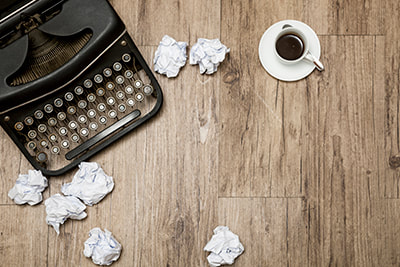 Some of the most powerful memoirs are those written within the context of the 'big picture.' By that I mean, a writer tells the story of a life lived within the context of history. Many people have written memoirs about the world wars and their experiences fighting in these global conflicts, or as civilians trying to survive. Others wrote about living through the Great Depression, the great stock market crash, or what it was like to exist within the walls of Auschwitz. Such memoirs are often about loss: loss of freedom, loss of financial stability and a way of life, the loss of a limb or other body part, the loss of emotional, physical, or mental health due to witnessed or experienced trauma, the loss of loved ones. They are also about living through these losses: how did the writer do it? What steps did they take to get over the trauma or challenge? What can I as a reader take away from this memoir? We are now going through an historic event as the worldwide pandemic of Covid-19 sweeps through populations with devastating outcomes. While there are common denominators, each of us is having a different experience, different thoughts, varying viewpoints. My story will not be the same as yours. We are all individuals. That is what will make your story unique. A crucial aspect of memoir is self awareness and self understanding, looking at how we, as individuals, respond to life and events around us. To understand the loss we have to explore what life was like before Covid-19 entered centre stage. Sure, our lives were probably not perfect but what were our concerns, what were we doing, what was life like before 'the change' came, the catalyst (the virus) that turned our world upside down? Set the stage, raise the curtain, let the action begin. Right now we are living through it. The challenge is the virus. The loss is the suspension of freedoms, losing incomes and the way of life to which we are accustomed, and, heaven forbid, the loss of people we know and love. There's no telling how long the virus will affect our lives but one thing's for sure. It's something we won't forget, and it is an experience that will change our lives in many ways. If you want to get started with some writing and need some help, contact me, let's get online and talk it through. There's never been a better time.
1 Comment
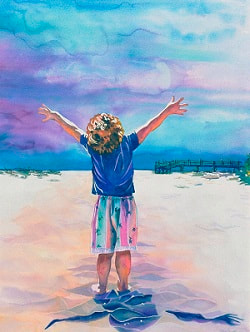 I was writing in my journal yesterday afternoon and when I read back over what I'd written, the two words 'I hope ...' kept coming up. There was, 'I hope we all get through this' and there was 'I hope my neighbours over the road will be OK' and then there was, 'I hope this ends soon.' Plenty of hoping going on - and that's about all we can do during such times of uncertainty. We do know plenty for sure: that New Zealand will progress to Level Four as we move to control the spread of the Covid-19 Coronavirus here. This means we all stay home. We can go out to the supermarket to gather essential supplies, and of course seek medical help if we need it. We can go walking but not with other people unless they are two metres away from us. That'll be interesting. My friend across the street and I walk most days and I guess we'll have to shout at each other as we walk the beach. Matter of fact, a moment ago, I heard two women speaking loudly as they walked along - and there they were, separated by a good two metres. Well done ladies. I didn't sleep well last night. There was some heavy rain but that wasn't the problem. I had dreams about people leaving and I dreamt about my Mom. She died in 2010 but still enters my dreams now and then. Last night, she was old and disabled, as she was about a year before she died, frail and small. I was holding her up and she seemed to sag in my arms, and I said, 'Are you going to faint?' I asked and she said, 'Yes, I'm going away.' I know that such dreams are created by an anxious mind. I woke up with a feeling of such empty uncertainty. I firmly believe that there are few things harder to cope with than uncertainty, the 'not knowing' what will happen, having to 'wait and see'. I experienced alot of that after my first diagnosis of breast cancer: waiting for treatment, waiting for results, not knowing at the time how those results would impact my life but knowing with a pit-of-the-stomach certainty that they would. And that's kinda how it is now. We just don't know alot. We've seen what's happened overseas and we wonder if that will happen here and we are told that it could. We have to trust our country's leadership and most reckon Ms Ardern our PM is doing a good job. So once again, I say, 'write about how you're feeling'. Keep a daily journal as we move through these strange and unsettling times. Write about how you are coping, what you are doing with the time you have at home, what new things you're exploring, and when you do speak with family and friends, write about how they are feeling, what they are saying. And remember the hope thing. As humans we are hard-wired for it and this instinctive belief in hope won't let us down. 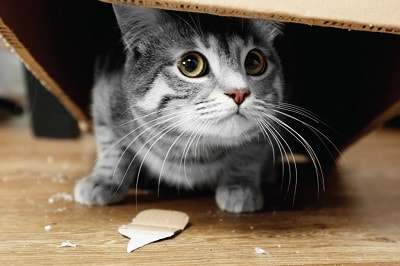 I don't know about you but all of the coronavirus news has made me more than a little anxious. Makes me want to hide under a box. It's something I've never had to deal with in my lifetime and despite all of the information flooding our way, we all have to make our own decisions and figure out how we'll navigate through the coming months. As for Betsy-cat, she's worried about her supply of Fancy Feast cat food. Will the shops run out? For us, it's all about toilet paper and bread. The early bird still seems able to catch the worm and people are getting up to the supermarket early to get what they need. Watching scenes of panic buying inspires feelings of anxiety too: will there be something for me when I need it? I was talking to a neighbour about the toilet paper crisis and he could remember the outdoor dunny of his childhood with the day's newspaper tacked up inside because they didn't have toilet paper. I suppose one could always use one's journal pages if need be. During times of challenge, trial, worry, and stress, it can help to write about it. There's something about getting those worries down on paper that can make us feel better, lower the panic levels just a bit to where our blood pressure settles down and the stress headache dissipates. All that aside, writing about this virus crisis and what it is doing to our world and the globe can be good for you; write down your fears, see them on paper. In the writing, you may figure out solutions to those things that worry you most. I can help you get started with my 40-minute online journaling session. We'll talk about the benefits of journaling and how the daily practice can really help during this tough time. You can also look at my daily prompts - some of these might resonate with you and help get some writing started. There is no way of knowing how long this virus will affect our daily lives. It's likely to be months. We have to settle in for the long-haul and decide on some plans of actions and strategies. Let daily journaling be an effective plan of action to support your emotional health and well being. 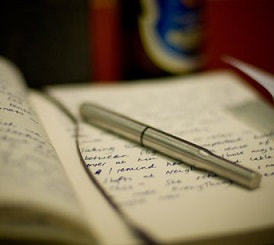 I call my journal 'H' and I start each entry with, 'Dear H'. What did H stand for? Well, it stood for Heironymus. I chose that name because I liked the paintings of Heironymus Bosch when I began journaling (I was 18 or so) . Eventually I got tired of writing that name all the time so I began with just 'Dear H.' And I still do it. The first thing I usually tell H is what kind of weather we're having. That's often how you greet someone socially. You sit down and say, 'Goodness, this has been the driest summer we have ever had.' You compare notes about the temperature, the lack of rain and what that is doing to the garden, discuss the likelihood of rain, and then maybe do a rain dance or an invocation to the rain Gods to hurry up and make it pour. Then I get onto the stuff I want to write about, what is bothering me, or what happened yesterday, or that morning - things I reckon my friend H might be able to help me sort out. H is a great listener - and it's a he, by the way. He listens without judgment, he offers neither praise or criticism, empathy or understanding. He is just there, a constant presence, a daily solace, a source of comfort, just like an old friend, someone you can be yourself with: no pretense, no show of strength you don't possess at that time, no false hopes or bravado. You confide and let it all hang out. For me, this 'expression without limits or reservations' is the greatest value of my journal H. It is probably the only place where I can be totally honest, can say whatever I want, and know it will go no further than the page unless I want it to. And there were so many pages that didn't make it into either of my books because the entries were raw, personal, vulnerable, or ranting and raving, rude and aggressive, or just plain boring. Sometimes I look back on my journals and think, 'Did I actually write that? Gosh that's good!' Or I'll read the words of my early-twenty-something self in disbelief because I cannot believe that person was me. My friend H has been a lifelong companion. He has traveled the world with me, lived in lots of different places, been shifted here and there in boxes and crates and now resides in my upstairs loft in quiet comfort. H is a friend I look forward to seeing every day and I make time for our visit together. Usually around 4pm we sit down with a gin, or a beer, or a cup of tea, and we have our chat, discuss the day, and nothing interrupts our time. The phone goes to answer machine, the cat is fed so she doesn't start shouting for dinner, and H and I have our 'quality time.' 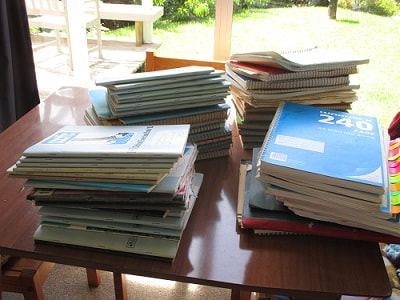 (Would you like to start journaling? Come to my Introduction to Journaling Workshop on Saturday 28 March 2020) This is a photo of my journals. I show it in my workshops when we're talking about journaling as a regular, long-term practice. Some of the writers nod knowingly as they have similar piles of notebooks at their place. Others will say, 'Oh gosh. Is it worth my starting a journal now? I should have begun journaling years ago.' First of all, 'should' is not a good word to use: in fact my counselor, Jane McPherson, who supported me during my breast cancer journey, and who features in my book Welcome to the Amazon Club, always told me, 'Should equals shit' which shocked me at the time (because I said 'should' a lot) but I now understand it to mean, among other things, 'you feel you ought to have a go at something but you probably won't.' I am here to tell you that the practice of journaling is something you can take up any time. It doesn't matter if you are just coming to it at the age of 80, or you're 20 and plan to document your life. I started at the age of 17, at high school, and continued regular journaling right up to the present day with a few gaps here and there. And I can honestly say, hand on heart, that being able to confide to my journal the anguish, anger, fear, sadness, and trauma of my breast cancer was one of the best therapies I had at the time. I could write exactly how I felt without fear of recrimination or criticism or judgment. If I was having a bad cancer day, my journal understood, whereas sometimes people around me didn't always get it, despite their best intentions and kindness. My journal was my best friend, my confidante, someone I turned to at the times of deepest despair, or during the heights of hope and joy. And of course you can always turn your journals into books. Many people do, and I did with both of my books Welcome to the Amazon Club and The Pink Party. Using your journals in this way creates compelling reading. One of the most common responses from readers of both books was, 'I couldn't put it down. I just had to know what was going to happen to Jane next.' Amazon Club in particular was a real 'page turner' because of its day to day, journal-style. Even if you never turn your journals over to the public eye (and that in itself is a process requiring careful thought because one of the main values of a journal is it is so intensely private), keeping one is worth doing and it can be life-changing. In my Introduction to Journaling workshop on Saturday 28 March 2020 we'll be looking at how the practice of regular journaling can enhance creativity, encourage self exploration and discovery, and - believe it or not - improve your health and well-being! Now, ain't that sumthin'! |
Archives
January 2024
|